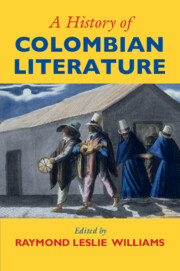Book contents
- Frontmatter
- Contents
- Notes on contributors
- Preface
- Introduction
- PART I LITERATURE AND SOCIETY IN COLOMBIA
- 1 Colonial realities and colonial literature in “Colombia”
- 2 Cosmography, ethnography, and the literary imagination of the New Kingdom of Granada
- 3 Colombian poetry from the colonial period to Modernismo (1500–1920)
- 4 Reflections on the historiography of the Colombian novel: 1844–1953 and beyond
- 5 Modern Colombian poetry: from modernismo to the twenty-first century
- 6 The late twentieth-century Colombian novel (1970–1999)
- 7 Twenty-first century fiction
- 8 Colombian theater: staging the sociopolitical body
- 9 The Colombian essay
- PART II COLOMBIAN CULTURE AND SOCIETY IN REGIONAL CONTEXTS
- PART III BEYOND THE BOUNDARIES
- AFTERWORDS
- Index
- References
4 - Reflections on the historiography of the Colombian novel: 1844–1953 and beyond
from PART I - LITERATURE AND SOCIETY IN COLOMBIA
Published online by Cambridge University Press: 05 June 2016
- Frontmatter
- Contents
- Notes on contributors
- Preface
- Introduction
- PART I LITERATURE AND SOCIETY IN COLOMBIA
- 1 Colonial realities and colonial literature in “Colombia”
- 2 Cosmography, ethnography, and the literary imagination of the New Kingdom of Granada
- 3 Colombian poetry from the colonial period to Modernismo (1500–1920)
- 4 Reflections on the historiography of the Colombian novel: 1844–1953 and beyond
- 5 Modern Colombian poetry: from modernismo to the twenty-first century
- 6 The late twentieth-century Colombian novel (1970–1999)
- 7 Twenty-first century fiction
- 8 Colombian theater: staging the sociopolitical body
- 9 The Colombian essay
- PART II COLOMBIAN CULTURE AND SOCIETY IN REGIONAL CONTEXTS
- PART III BEYOND THE BOUNDARIES
- AFTERWORDS
- Index
- References
Summary
The first notions of a Colombian literature as such, as well as concepts of a national culture and identity in general, were nineteenth-century inventions authored primarily by a minority of intellectuals. In the wake of their struggle for independence from colonial rule during the first three decades of the nineteenth century, the urgent task at hand for the Creole elites of the former Spanish colonies was the consolidation of their respective republics and the creation of nations. This was a tumultuous endeavor characterized by internal conflict that predominated the nineteenth century and, for some states, reached well into the twentieth century. As territorial boundaries were (re)defined and institutions were constructed, national cultures were being articulated. While the novel and print capitalism did play an instrumental role in fostering national consciousness in the Americas, as suggested in Benedict Anderson's classic book on “imagined communities,” subsequent studies have emphasized that it is much more accurate to speak of multiple contested meanings of national identity and of very disparate projects of national formation throughout the first century of post-Colonial existence in Spanish America (see Castro-Klarén and Chasteen). In the Colombian context this was very much the case, and the official institutionalization of a national literature in general and a national novel in particular can be understood as a century-long project whose trajectory is inscribed on the backdrop of the fragmented realities of the nation-state.
The Republic of Colombia – commonly referred to as Gran Colombia – was established in 1819 and included a region currently comprising Colombia, Ecuador, Panama, Venezuela, and parts of northwestern Brazil, western Guyana, and northern Peru. Following the disintegration of Gran Colombia and the subsequent civil war fought between 1830 and 1831, the formation of the Republic of New Granada in 1832 marks the beginning of the juridical – political entity that would become present-day Colombia. The actual name of the state, however, underwent additional transformations in the nineteenth century: In 1858 it became the Grenadine Confederation, in 1863 the United States of Colombia, and in 1886, once again, the Republic of Colombia. These name changes, as well as the numerous disputes, constitutions, and wars that marked the period, all reflect the conflictive nature of Colombia's nineteenth century, which, it should be pointed out, was not unlike that of other nascent republics in the Americas.
- Type
- Chapter
- Information
- A History of Colombian Literature , pp. 80 - 91Publisher: Cambridge University PressPrint publication year: 2016

